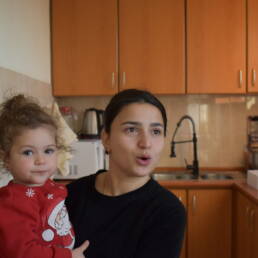During his visit to Ukraine, Caritas Europa’s President Msgr. Michael Landau brought a message of solidarity to civilians whose houses have been destroyed and paid tribute to the victims of the war, visiting the site of mass graves in Bucha. “Caritas’ engagment in helping civilians will continue for as long as is needed”, he said.
On 27-29 January, a Caritas Europa delegation led by the President and the forthcoming International Cooperation and Humanitarian Director, Jean-Yves Terlinden, visited Kyiv and the surrounding devasted areas. They met with the affected population in Irpin, whose houses were destroyed by military attacks and where Caritas is supporting reconstruction. In the country, more than 17 million people need humanitarian aid. Msgr. Landau and Terlinden expressed their heartfelt solidarity with the families who lost their loved ones and helped Caritas staff and volunteers distribute humanitarian packages. The visit also included moments of deep spiritual connection with the local population at the cemetery of Irpin and the mass burial site in Bucha. They also visited the destroyed villages of Moschun, Rakivka and Voronkivka.
We are concerned about the dramatic suffering of many people trapped in contested areas. They often live in basements without toilets, light or water. In these freezing winter temperatures, the attacks on infrastructure become a deadly danger. We must not abandon the people who have absolutely nothing. Together we can rebuild their houses and their communities; no matter how long it will take and how hard it seems to be now.”
Msgr Michael Landau, President of Caritas Europa
Since the war started, almost a year ago, Caritas Ukraine and Caritas Spes Ukraine have helped more than four million people by providing many services, including in-kind donations, cash assistance, food, water, heating kits, house reparations, schooling and psychosocial assistance.
In the very first days of the crisis, Caritas established an Emergency Response Support Team, under the overall leadership of Silvia Sinibaldi, previous International and Humanitarian Director of Caritas Europa, to coordinate the network’s support to its member organisations in Ukraine and the neighbouring countries (Poland, Hungary, Slovakia, Czech Republic, Moldova and Romania). In 2022, in these neighbouring countries combined, Caritas has helped more than 700,000 people who have fled the war. Caritas has also pledged globally more than 100 million euros for humanitarian assistance in Ukraine. Despite this unprecedented level of support, more financial help will be needed to continue with dozens of Caritas projects in Ukraine and the wider region.
One year on, the war continues, and with it, the humanitarian crisis also continues. So many need assistance with shelter, heat, water, food, and medicine. Entire communities have been displaced, and their homes, villages, cities, and livelihoods destroyed. Intensified attacks on energy infrastructure are worsening an already difficult situation of mass displacement. Amid this ongoing tragedy, we bring hope to heal and restore relationships. We thank the entire Caritas confederation and our individual and institutional donors for the support that has been provided to millions of Ukrainians.”
Tetiana Stawnychy, President of Caritas Ukraine
During the full-scale Russian invasion of Ukraine, we received a vital contribution from the Caritas family. The visit of the President of Caritas Europa to Kyiv is an important sign for us that shows warmth and interest in the people we serve. We feel that we are not alone.”
Vyacheslav Grynevych, Executive Director of Caritas Spes Ukraine
Thanks to the support of the confederation, but also through private and institutional donors, Caritas Ukraine and Caritas Spes Ukraine want to continue and expand their operations focused on:
- Emergency response (food and hygiene kits, shelters, cash assistance and education);
- Reconstruction of damaged housing;
- Increasing the distribution of stoves, generators and hot food;
- The expansion of the humanitarian operations throughout the country, especially in Odesa, Kharkiv and Mykolaiv regions.
During the visit, Msgr. Landau and Terlinden also held meetings with the United Nations Office for the Coordination of Humanitarian Affairs (OCHA) as well as the Greek-Catholic Bishop of Kharkhiv, Vasil Tutschapez, to discuss the humanitarian situation and how to plan work in the months ahead.
The Caritas Europa delegation concluded its solidarity visit at the headquarters of Caritas Moldova in Chisinau. Despite the acute economic crisis in the country, Caritas Moldova is currently supporting over 6,000 refugees by providing most of them with safe shelter.
More information
Susan Dabbous
Media Officer
Tel: +32 (0)2 235 03 94
Mob: +32 (0)478 58 54 35
sdabbous@caritas.eu




